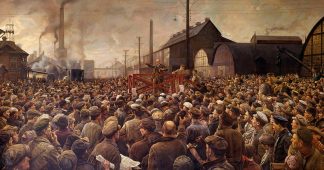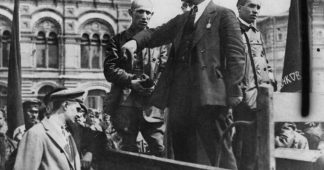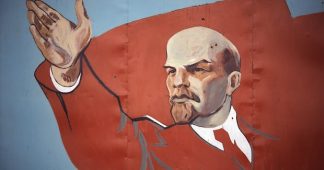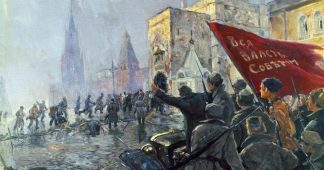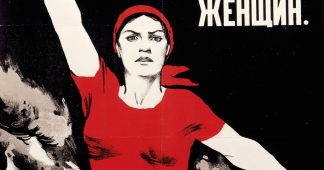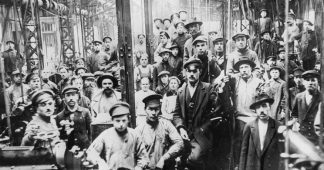Revolution at the Gates
by V. I. Lenin
In Revolution at the Gates, Slavoj Žižek locates the 1917 writings in their historical context, while his afterword tackles the key question of whether Lenin can be reinvented in our era of “cultural capitalism.” Žižek is convinced that, whatever the discussion—the forthcoming crisis of capitalism, the possibility of a redemptive violence, the falsity of liberal tolerance—Lenin’s time has come again.
The Soviet Century
by Moshe Lewin
One hundred years after the Russian Revolution the Soviet Union remains the most extraordinary, yet tragic, attempt to create a society beyond capitalism. Yet its history was one that for a long time proved impossible to write.
In The Soviet Century, Moshe Lewin follows this history in all its complexity, guiding us through the inner workings of a system which is still barely understood. In the process he overturns widely held beliefs about the USSR’s leaders, the State-Party system and the powerful Soviet bureaucracy.
Revolutionary Yiddishland
by Alain Brossat and Sylvia Klingberg
Jewish radicals manned the barricades on the avenues of Petrograd and the alleys of the Warsaw ghetto; they were in the vanguard of those resisting Franco and the Nazis. They originated in Yiddishland, a vast expanse of Eastern Europe that, before the Holocaust, ran from the Baltic Sea to the western edge of Russia and incorporated hundreds of Jewish communities with a combined population of some 11 million people. This book traces the struggles of these militants, their singular trajectories, their oscillation between great hope and doubt, their lost illusions—a red and Jewish gaze on the history of the twentieth century.
Terrorism and Communism
by Leon Trotsky
Written in the white heat of revolutionary Russia’s Civil War, Trotsky’s Terrorism and Communism is one of the most potent defenses of revolutionary dictatorship. In his provocative commentary to this new edition the philosopher Slavoj Žižek argues that Trotsky’s attack on the illusions of liberal democracy has a vital relevance today.
Thoughtful and intimate, Fear of Mirrors unfolds an expansive plot that touches on the greatest political upheavals of the twentieth century. Its protagonist captures the hopes once roused by the Bolshevik Revolution and the hard realities that followed; Vlady Meyer is a mirror reflecting impeccably the intellectual milieu of an incomparable period.
The Prophet
by Isaac Deutscher
Few political figures of the twentieth century have aroused such intensities of fierce admiration and reactionary fear as Russian revolutionary Leon Trotsky. His extraordinary life and extensive writings have left an indelible mark on the revolutionary consciousness. Yet there was once a danger that his life and influence would be relegated to the footnotes of history.
Published over the course of ten years, beginning in 1954, Deutscher’s magisterial three-volume biography turned back the tide of Stalin’s propaganda, and has since been praised by everyone from Tony Blair to Graham Greene. In this definitive work, now reissued in a single volume, Trotsky’s true stature emerges as the most heroic, and ultimately tragic, character of the Russian Revolution.
War and Revolution
by Domenico Losurdo
In this vigorous riposte to revivionist historians who would denigrate the history of emancipatory struggle, Losurdo captivates the reader with a tour de force account of modern revolt, providing a new perspective on the English, American, French and Russian revolutions.
Collected Works, Volume 1
by V. I. Lenin
Re-launch of the Collected Works of the legendary revolutionary in paperback
Trotsky as Alternative
by Ernest Mandel
Ranging across Trotsky’s struggles against Stalin’s bureaucracy, his formulation of an alternative economic strategy, his theories relating to the Third World, fascism and the national question, his extensive literary criticism, and concluding with a moving assessment of an extraordinary life, this book is a fitting testimony to a man who, in Mandel’s words, “will be judged by history as the most important strategist for the socialist movement.”
History and Revolution
Edited by Mike Haynes and Jim Wolfreys
In History and Revolution, a group of respected historians confronts the conservative, revisionist trends in historical enquiry that have been dominant in the last twenty years. Ranging from an exploration of the English, French, and Russian revolutions and their treatment by revisionist historiography, to the debates and themes arising from attempts to downplay revolution’s role in history, History and Revolution also engages with several prominent revisionist historians, including Orlando Figes, Conrad Russell and Simon Schama.
With contributions by Daniel Bensaïd, Geoff Eley, Marc Ferro, Florence Gauthier, Mike Haynes, Geoff Kennedy, Lars T. Lih, Enzo Traverso, and Jim Wolfreys
How do mass protests become an organized activist collective?
Crowds and Party channels the energies of the riotous crowds who took to the streets in the past five years into an argument for the political party. Rejecting the emphasis on individuals and multitudes, Jodi Dean argues that we need to rethink the collective subject of politics.
The Legacy of Rosa Luxemburg
by Norman Geras
During the first decades of the twentieth century, Rosa Luxemburg was the leader of the workers’ movement in Poland and Germany. She made a remarkable contribution to socialist theory and practice, yet her legacy remains in dispute. In this book Geras brings new light to bear on one of the most misrepresented figures in radical history, illustrating her inspiring lack of complacency and her commitment to questioning those in authority on both the Right and the Left.
A giant of the political left, Rosa Luxemburg is one of the foremost minds in the canon of revolutionary socialist thought. But she was much more than just a thinker.
In this beautifully drawn work of graphic biography, writer and artist Kate Evans has opened up her subject’s intellectual world to a new audience, grounding Luxemburg’s ideas in the realities of an inspirational and deeply affecting life.
On the Dictatorship of the Proletariat
by Etienne Balibar
No-one and nothing, not even the Congress of a Communist Party, can abolish the dictatorship of the proletariat. That is the most important conclusion of this book by Etienne Balibar. Balibar spells out his reasoning against the background of the 22nd Congress of the French Communist Party, which decided to ‘drop’ the aim of the dictatorship of the proletariat and to substitute the objective of a ‘democratic’ road to socialism. His concrete references are therefore usually to arguments put forward within the French Party. But it is quite obvious that the significance of this book is much wider, not least because, in spite of the important political and economic differences separating the nations of western Europe, many of their Communist Parties are evolving in an apparently similar ideological direction, and indeed appear to be borrowing arguments from one another in support of their new positions.
Armed Insurrection
by A Neuberg
This book was produced in 1928 as a practical insurrectionary manual for communists. It discusses the role of armed insurrection in the Marxist-Leninist theory of revolution, analyses a number of insurrections—both successful and unsuccessful—with the aim of determining the conditions for victory, and gives detailed information on the tactics of street fighting—ranging from the respective advantages of offensive or defensive action to the best method of building a barricade. Written in Moscow under Comintern auspices, it is a classic Third Period document. Its republication will contribute to the recovery and appraisal of the early years of Soviet and Comintern history which is so essential an ingredient in the forging of all revolutionary theory and practice today.
Published under the pseudonym of ‘A. Neuberg’, the work was in fact written by a group of leading Comintern political and military experts.
Victor Serge
by Susan Weissman
Revolutionary novelist, historian, anarchist, Bolshevik and dissident – Victor Serge is one of the most compelling figures to have emerged from the history of the Soviet Union. Carefully wrought and meticulously researched, Susan Weissman’s Victor Serge is the definitive biography of an extraordinary man.
Karl Kautsky and the Socialist Revolution 1880-1938
by Massimo Salvadori
A serious and measured exposition of the terms on which arguments for socialist strategy currently move.
Marxism, Wars & Revolutions
by Isaac Deutscher
A lasting collection of some of Deutscher’s most powerful texts.
A trenchant account of Leninism from a giant of Marxist philosophy.
Tactics and Ethics
by Georg Lukács
Tactics and Ethics collects Georg Lukács’s articles from the most politically active time of his life, a period encompassing his stint as deputy commissar of education in the Hungarian Soviet Republic. Including his famed essay on parliamentarianism—which earned Lukács the respectful yet severe criticism of Lenin—this book is a treasure chest of valuable insights from one of history’s great political philosophers.
The Verso Book of Dissent
Edited by Andrew Hsiao and Audrea Lim
This anthology, global in scope, presents voices of dissent from every era of human history: speeches and pamphlets, poems and songs, plays and manifestos. Every age has its iconoclasts, and yet the greatest among them build on the words and actions of their forerunners. The Verso Book of Dissent should be in the arsenal of every rebel who understands that words and ideas are the ultimate weapons.
Ernest Mandel’s book provides the first ever synthetic account of the development of Trotsky’s Marxism in its successive encounters with the key problems and crises of the epoch. The Russian revolution and the theme of uneven development, the construction of revolutionary parties, the struggle against fascism and imperialism at large, the nature of Stalinism and the prospect of a full socialist democracy, are all discussed in a compact study that makes a fitting and long overdue counterpart to Lukács’s historic study of fifty years ago.
A History of Vodka
by William Pokhlebkin
Finally, raise a toast to the bearded one: a history of Vodka!
